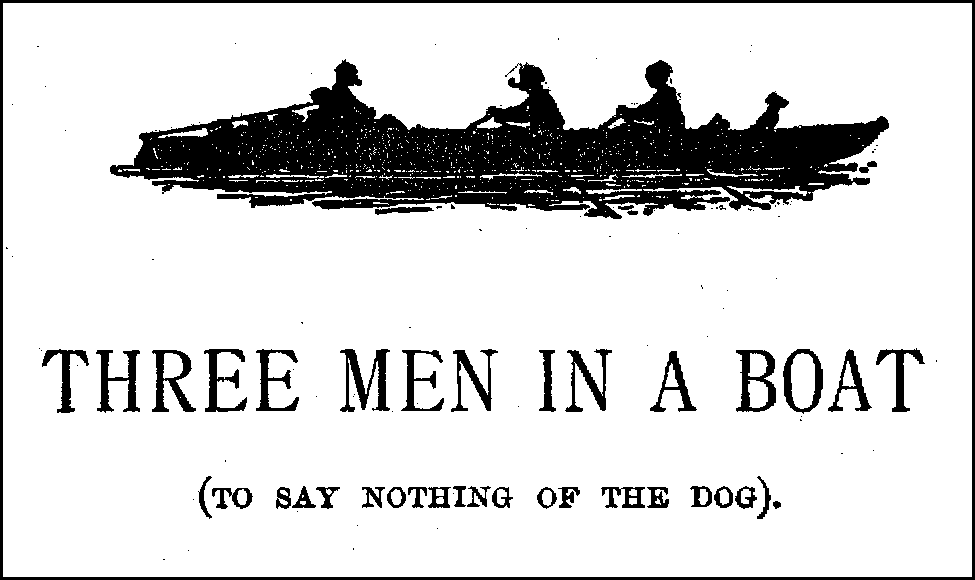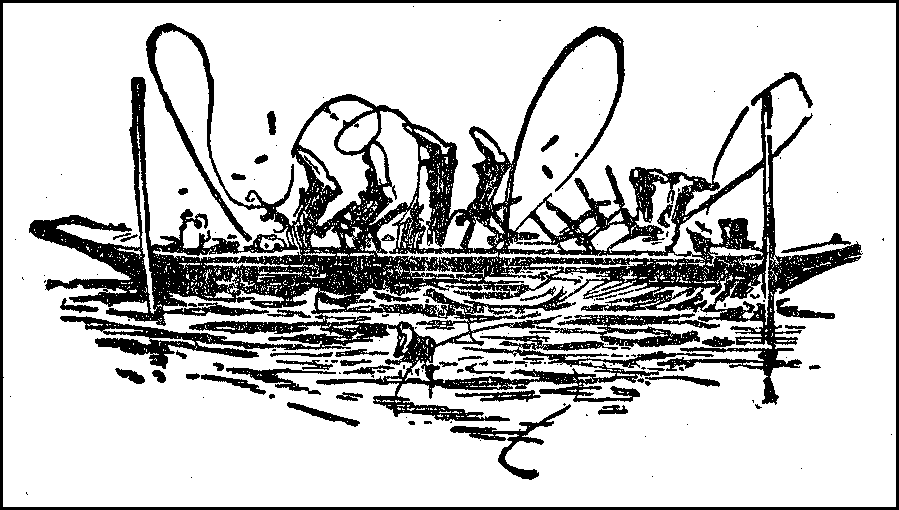
Three Men in a Boat
(To Say Nothing of the Dog)
Jerome K. Jerome
Martin Jarvis, Reader
(Naxos AudioBooks)

Three Men in a Boat has survived these many years, I believe, because of its eloquent diction, dry wit, and a commonalty of frustration that you and I are bound to have with the simple accouterments of everyday life. It also carries an underlying sweetness.It was not Jerome K. Jerome's first book, nor was it his last --- but it was and is and presumably will always continue to be one of the most wonderful of writings in the English language.
The story is a simple one. The author and two friends determine to take a leisurely trip in a boat up the Thames from London to Oxford. There's Harris and George, the fox-terrier Montmorency, and the author, called here J.
As they are preparing their bags, the dog makes his presence known: "Montmorency was in it all, of course. Montmorency's ambition in life, is to get in the way and be sworn at. If he can squirm in anywhere where he particularly is not wanted, and be a perfect nuisance, and make people mad, and have things thrown at his head, then he feels his day has not been wasted."
He came and sat down on things, just when they were wanted to be packed; and he laboured under the fixed belief that, whenever Harris or George reached out their hand for anything, it was his cold, damp nose that they wanted. He put his leg into the jam, and he worried the teaspoons, and he pretended that the lemons were rats, and got into the hamper and killed three of them before Harris could land him with the frying-pan.
"Harris said I encouraged him. I didn't encourage him. A dog like that don't want any encouragement. It's the natural, original sin that is born in him that makes him do things like that."
§ § § There is in Jerome's writing a classical English Upper Class restraint. When Jay accidentally runs into a fishing boat, knocking the fishermen into "a general heap at the bottom of the boat," he reports that the men, while they "picked fish off themselves" seemed "vexed and discontented." Then he launches into what is the oldest shaggy-dog story-line, in this case, a report on the language aimed at J, Harris and George by these fisherfolk:
As they worked, they cursed us --- not with a common cursory curse, but with long, carefully-thought-out, comprehensive curses, that embraced the whole of our career, and went away into the distant future, and included all our relations, and covered everything connected with us --- good, substantial curses.
Jerome's writing is a poetry of restraint, something that would not possibly be handled so gently, I believe, in our own age.
It has been many years since I have traveled up the Thames with Jerome K. Jerome, but I have never forgotten certain passages: the "200 horsepower cheeses;" why one should never take "methylated spirits" along on a boat-trip; the various ways of making Irish stew. These are passages so classic that --- as with Perelman's story of going around the world in Westward Ha! or living in idyllic splendor in rural Pennsylvania in Acres and Pains --- one can go over them again and again and never weary of them, always remembering certain piquant phrases: Perelman's exotic meal that he calls "an eerie gumbo;" JKJ telling us that he cannot store a Liverpudlian cheese because his landlady does not want "to be put upon."
Somehow I had gotten the idea that Jerome was a Cambridge or Oxford man, but research tells us that it was not so. He lived in exasperating poverty as an itinerant journalist up to the time of his marriage in 1888. The famous journey up the Thames was not in the company of two other men (and a dog) but his new wife. He had vowed early on in his life to write a successful play, a successful book, and be a member of parliament (only the last he was unable to accomplish). He wrote many successful (albeit heavily Victorian) plays, and of his twelve books, one, at least --- this one --- made him rich and famous.
For me, hearing Three Men in a Boat read aloud is a new experience. Martin Jarvis attacks the text with what I thought, at first, to be too much vigor, but it grows on one. He knows pacing; and he takes us many places we had forgotten.
Especially asides. Like most good travel books, this one contains not only the story of a single journey, but dozens of memories of other equally silly journeys, in this case of George, Harris, and J, their friends and family, near relatives, distant cousins, strangers.
There is, too, the constant, and enlightening introduction of historical facts: this is where Henry VIII and Ann Boleyn were courting (bringing on an extended exegesis on how dull it is to be around couples courting); that was the place where Edward II fell in battle; here is where Caesar crossed the Thames and camped.
I had also forgotten the many excursions into Swinburnian prosody, a type of language that Perelman for one doted on mocking. Just before the collision with the fishermen, Jay tells us that "the red sunset threw a mystic light upon the waters, and tinged with fire the towering woods, and made a golden glory of the piled-up clouds. It was an hour of deep enchantment, of ecstatic hope and longing. The little sail stood out against the purple sky, the gloaming lay around us, wrapping the world in rainbow shadows; and, behind us, crept the night."
We seemed like knights of some old legend, sailing across some mystic lake into the unknown realm of twilight, unto the great land of the sunset.
But then,
We did not go into the realm of twilight; we went slap into that punt, where those three old men were fishing. We did not know what had happened at first, because the sail shut out the view, but from the nature of the language that rose up upon the evening air, we gathered that we had come into the neighbourhood of human beings, and that they were vexed and discontented.

The key to Jerome's style is repetition, loving exaggeration, and the slow accretion of an idea, blowing it up till it bursts, scattering it all over the page. Consider the fuel used in those days for cooking and lighting, "paraffine oil" (what we know of as kerosene). What could you or I say about it that would extend over a sentence or two? Jerome, like a dog with a bone, refuses to let it go (and it goes everywhere with him):We had taken up an oil-stove once, but "never again." It had been like living in an oil-shop that week. It oozed. I never saw such a thing as paraffine oil is to ooze. We kept it in the nose of the boat, and, from there, it oozed down to the rudder, impregnating the whole boat and everything in it on its way, and it oozed over the river, and saturated the scenery and spoilt the atmosphere. Sometimes a westerly oily wind blew, and at other times an easterly oily wind, and sometimes it blew a northerly oily wind, and maybe a southerly oily wind; but whether it came from the Arctic snows, or was raised in the waste of the desert sands, it came alike to us laden with the fragrance of paraffine oil.
And that oil oozed up and ruined the sunset; and as for the moonbeams, they positively reeked of paraffine.
We tried to get away from it at Marlow. We left the boat by the bridge, and took a walk through the town to escape it, but it followed us. The whole town was full of oil. We passed through the church-yard, and it seemed as if the people had been buried in oil. The High Street stunk of oil; we wondered how people could live in it. And we walked miles upon miles out Birmingham way; but it was no use, the country was steeped in oil.
At the end of that trip we met together at midnight in a lonely field, under a blasted oak, and took an awful oath (we had been swearing for a whole week about the thing in an ordinary, middle-class way, but this was a swell affair), an awful oath never to take paraffine oil with us in a boat again --- except, of course, in case of sickness.
Therefore, in the present instance, we confined ourselves to methylated spirit [denatured alcohol]. Even that is bad enough. You get methylated pie and methylated cake. But methylated spirit is more wholesome when taken into the system in large quantities than paraffine oil.
--- Alan A. Keating